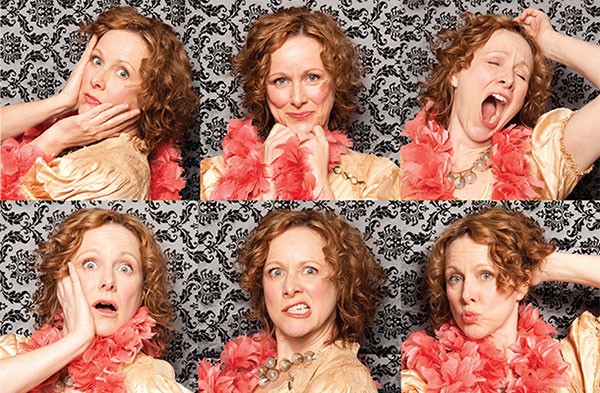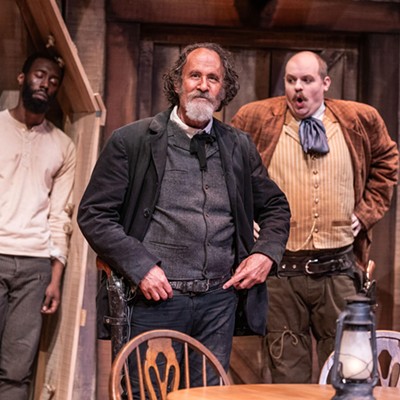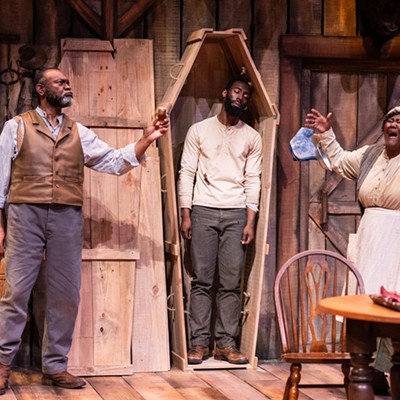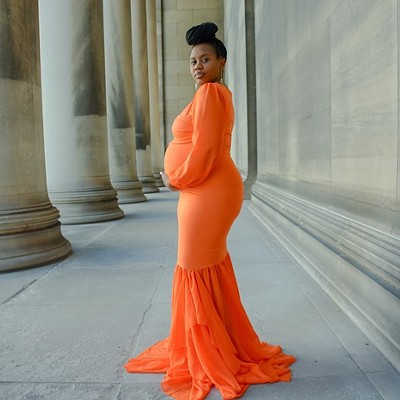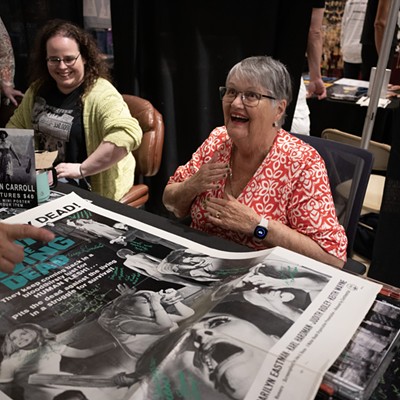Over the past four years, Gab Cody's cut a swath through local theater. Since 2011, she has: written and co-starred in Fat Beckett, an audacious comedic update of Waiting for Godot, for Quantum Theatre; served as lead writer on Bricolage Productions' wildly ambitious immersive hit STRATA; written and directed, in collaboration with Point Park theater students, the zany comedy The Alchemist's Lab; and collaborated on OJO, another immersive work with Bricolage.
And all that's not counting plays she wrote or co-wrote that received staged or workshop readings in Pittsburgh and elsewhere ... or 2014's Progression, the feature-length, locally produced indie film comedy made with collaborator (and spouse) Sam Turich, which is now on the festival circuit.
Cody's work has drawn critical acclaim — for STRATA especially — and raves from collaborators. "We think that she's really just incredible at what she does," says Bricolage co-artistic director Tami Dixon, praising Cody's combination of intelligence and comedic sensibility. Quantum artistic director Karla Boos says, simply, "I'm awed by her brain."
Now comes the premiere of Cody's comedy Prussia: 1866, at Point Park's The REP theater company. It is the play you've been waiting for: a romantic farce about the young Friedrich Nietzsche and 19th-century feminism. It's also a part of Cody's continuing mission to both address serious topics in comedic ways and, as she says, "to reintroduce style to theater."
Prussia grew out of Cody's graduate theater studies at Point Park University. The Alaska native began studying there in 2008, shortly after she and Pittsburgh native Turich moved here from Brooklyn. As a writer, she was fascinated by questions of morality and social responsibility, especially how we address them absent religion. Such precisely was the turf of Mr. God is Dead himself, and Cody later learned that the young Nietzsche, intriguingly, had proto-feminist friends.
As to her play's form, Cody embraces Brecht's dictum that comedy, far from frivolous, is a superior tool for social commentary. "Farce is taboo-bursting and Nietzsche is taboo-bursting," she says, adding, "I find I'm more convinced by people who have a sense of humor than by those who don't."
In 1866, Nietzsche was indeed 22 and living in Prussia; otherwise, Cody's play is complete fiction, centering on bookish Fritz's affair with Mariska, the saucy younger wife of his mentor and benefactor, pompous novelist Heinrich Von Klamp. In the play's two acts of one long, hurtling scene each, Cody plots in: Heinrich's assistant, Rosemary, an early feminist; innocent maid Karoline; an American delegate; and Griselda, an older "liberated poetess."
Fritz is played by recent Point Park grad Drew Palajsa. The cast also includes: Laura Lee Brautigam, Philip Winters, Hayley Nielsen and Mary Rawson, with Cody herself as Rosemary and Turich as the delegate. Kim Martin directs. Expect witty dialogue, patriarchal condescension, rampant wordplay (a Cody hallmark), class conflict, physical comedy, brief nudity and exchanges like this: "FRITZ: Cynicism is a defeatist approach to life. ROSEMARY: Why would a defeatist bother with an approach?"
Cody lives in Lawrenceville with Turich, an actor and director, and their daughter, Mathilda, 7. In addition to her theatrical work, she has taught theater at local universities and written and produced segments for the PBS Fred Rogers Co. show Daniel Tiger's Neighborhood.
Cody contends that in theater and film, our culture's default setting on naturalism is stifling. She likes The Deer Hunter as well as anyone, she says; she and frequent collaborator Turich simply prefer such artistic models as My Man Godfrey and other 1930s screwball comedies.
Quantum's Boos sees Cody as a parodist: Just as Cody and Turich's popular 2009 short film "Mombies" spoofed zombie films, so Fat Beckett turned Godot on its head (substituting affluent female explorers for hopeless male tramps to send up, in part, consumerism).
"The coolest thing about her is that she parodies genre. I don't know anybody else who does that," says Boos, who's read Prussia and considers it a send-up of 19th-century drawing-room dramas.
Bricolage's Dixon says Cody "uses comedy as a way to talk about things that are sometimes hard to talk about." Running through the choose-your-own-adventure format of STRATA, for instance, was a pungent satire of self-actualization seminars. "She's commenting on the world through a larger-than-life viewpoint," says Dixon. "I don't know anyone else like her."
Cody is a feminist who wants Prussia to get the audience questioning patriarchy in both 1860s Europe and 2010s America, even as it's laughing at Rosemary, Fritz and Mariska. True to farce, she says, "I think everyone in the play is absurd." But, she clarifies in an email, "I think Brecht said it best when he said all theater is political; if it's not political, your play is just reinforcing the status quo."
The goal is comedy as sophisticated social commentary. As Cody puts it, "I'm just making the work that I want to go see."

